Steve Lopez: Trump's order on homelessness gets it all wrong, and here's why
Published in Op Eds
President Trump has the answer to homelessness.
Forcibly clear the streets.
On Thursday, he signed an executive order to address "endemic vagrancy" and end "crime and disorder on our streets." He called for the use of "civil commitments" to get those who suffer from mental illness or addiction into "humane treatment."
This comes after last year's U.S. Supreme Court ruling making it legal for cities to punish people for being homeless, even if they have nowhere to go.
There's some truth in what he says, and California's record on housing and homelessness is ripe for criticism. I've watched too many people suffer from addiction and mental illness and asked why the help is so slow to arrive. But I also know there are no simple answers for either crisis, and bluster is no substitute for desperately needed resources.
Like a lot of what Trump does, this is another case of grandstanding. In the meantime, the Washington Post reported Thursday that the "Trump administration has slashed more than $1 billion in COVID-era grants administered by the Substance Abuse and Mental Health Services Administration and is proposing to slash hundreds of millions more in agency grants."
As it happens, I was in the middle of a column on the latest Los Angeles homeless count when news of Trump's executive order broke. I had just spent time with two homeless women to hear about their predicaments, and none of what Trump is proposing comes close to addressing their needs, which are tragically commonplace.
Namely, they're living in poverty and can't afford a place to live.
In his executive order, Trump said that "nearly two-thirds of homeless individuals report having used hard drugs … in their lifetimes. An equally large share of homeless individuals reported suffering from mental health conditions."
I don't know where he got those numbers, but truth and accuracy are not hallmarks of this administration.
No doubt, addiction and mental illness are significant factors, and more intervention is needed.
But that's more complicated than he thinks, especially given the practical and legal issues surrounding coercive treatment — and it's not going to solve the problem.
When the latest homeless count in Los Angeles was released, a slight decline from a year ago was regarded by many as a positive sign. But when Eli Veitzer of Jewish Family Service L.A. dug into the numbers, he found something both unsurprising and deeply disturbing.
The number of homeless people 65 and older hadn't gone down. It had surged, in both the city and county of Los Angeles.
"This isn't new this year. It's a trend over the last couple of years," said Veitzer, whose nonprofit provides meals, housing assistance and various other services to clients. "It's meaningful, and it's real, and these people are at the highest risk of mortality while they're on the streets."
The numbers from the Los Angeles Homeless Services Authority showed a 3.4% decrease in the total homeless population in the city, but a 17.6% increase among those 65 and older. The county numbers showed a 3.99% decrease overall, but an 8.59% increase in the 65 and older group.
In the city, the increase over two years was from 3,427 in 2023 to 4,680 this year — up 37%.
Reliable research has shown that among older adults who become homeless, the primary reason is the combination of poverty and high housing costs, rather than mental illness or addiction.
"They or their spouse lost their job, they or their spouse got sick, their marriage broke up or their spouse or parent died," Dr. Margot Kushel of UC San Francisco's Homelessness and Housing Initiative was telling me several hours before Trump's executive order was issued.
Her team's landmark study, released two years ago (and covered by my colleague Anita Chabria), found that nearly half the state's homeless residents were 50 and older, and that participants in the study reported a median monthly household income of $960.
"The results … confirm that far too many Californians experience homelessness because they cannot afford housing," Kushel said at the time.
Among the older population, Veitzer said, the jump in homelessness comes against the backdrop of federal and local budget cuts that will make it harder to reverse the trend. And harder for nonprofits, which rely in part on public funding, to keep providing group meals, home-delivered meals, transportation, social services and housing support.
"Every provider I've talked to in the city of L.A. is cutting meal programs," Veitzer said. "We're going to have to close two of our 13 meal sites, and last year we closed three. We used to have 16, and now we're down to 11."
On Wednesday, I went to one of the sites that's still up and running on Santa Monica Boulevard, just west of the 405, and met Jane Jefferies, 69. She told me she's been camping in her vehicle since February when living with her brother became impossible for various reasons. She now pulls into a Safe Parking L.A. lot each night to bed down.
Jefferies said she collects about $1,400 a month in Social Security, which isn't enough to get her into an apartment. At the senior center, she uses her own equipment to make buttons that she sells on the Venice boardwalk, where she can make up to $200 on a good weekend.
But that's still not enough to cover the cost of housing, she told me, and she's given up on government help.
"All the funding has been cut, and I don't know if it's because a lot of the city and state funding is subsidized by the federal government. We all know Trump hates California," she said.
As Veitzer put it: "There's nowhere near enough low-income senior housing in L.A. County. Wait lists open up periodically," with far more applicants than housing units. "And then they close."
His agency delivers a daily meal to Vancie Davis, 73, who lives in a van at Penmar Park in Venice. Her next-door neighbor is her son, Thomas Williamson, 51, who lives in his car.
Davis was in the front seat of the van when I arrived, hugging her dog, Heart. Her left leg was amputated below the knee two years ago because of an infection, she told me.
Davis said she and another son were living in a trailer in Oregon, but the owner shut off the utilities and changed the locks. She said she reached out to Williamson, who told her, "I've got a van for you, so you'll have a place to live, but it's going to be rough. And it is. It's very, very rough."
I've heard so many variations of stories like these over the years, I've lost count.
The magnitude that exists in the wealthiest nation in history is a disgrace, and a sad commentary on an economic system and public policy that have served to widen, rather than narrow, the inequity gap.
On Thursday, Trump's executive order on homelessness grabbed headlines but will do nothing for Jane Jefferies or Vancie Davis and for thousands like them. We know the interventions that can work, Kushel said, but with deep cuts in the works, we're moving in the wrong direction.
Davis' son Thomas told Times photographer Genaro Molina about another person who lives in a vehicle and has been a neighbor of theirs in the parking lot.
She wasn't there Wednesday, but we'll check back.
It's a 91-year-old woman.
steve.lopez@latimes.com
This story originally appeared in Los Angeles Times.
©2025 Los Angeles Times. Visit latimes.com. Distributed by Tribune Content Agency, LLC. ©2025 Los Angeles Times. Visit at latimes.com. Distributed by Tribune Content Agency, LLC.
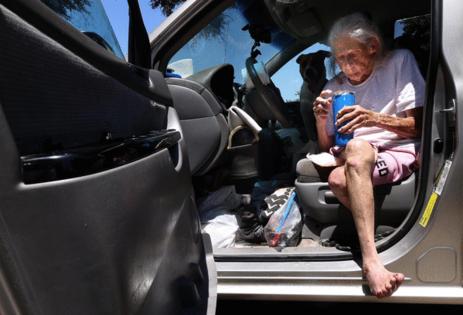
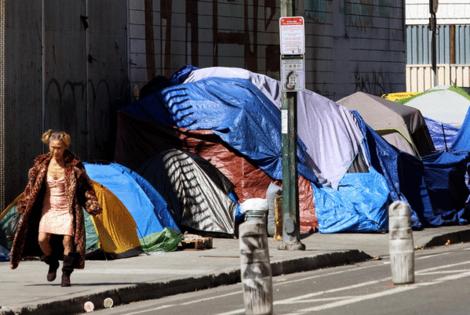
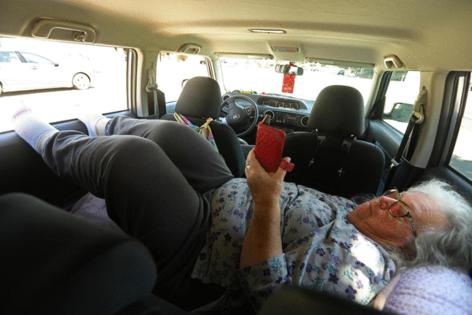
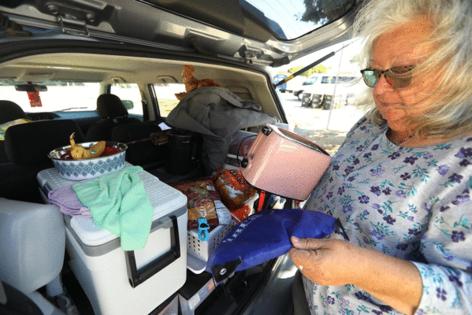
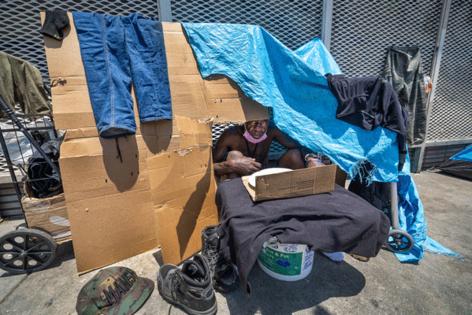





























































Comments